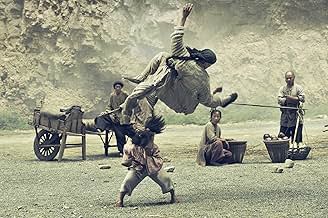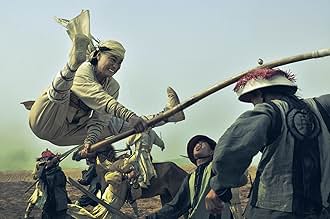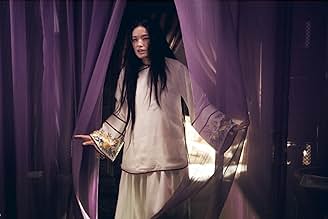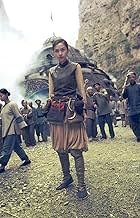AVALIAÇÃO DA IMDb
6,0/10
5,3 mil
SUA AVALIAÇÃO
Adicionar um enredo no seu idiomaYang travels to Chen Village to learn a powerful form of Tai Chi. Though villagers are forbidden from teaching outsiders, Yang becomes their best hope for survival when a man arrives with a ... Ler tudoYang travels to Chen Village to learn a powerful form of Tai Chi. Though villagers are forbidden from teaching outsiders, Yang becomes their best hope for survival when a man arrives with a plan to build a railroad through the village.Yang travels to Chen Village to learn a powerful form of Tai Chi. Though villagers are forbidden from teaching outsiders, Yang becomes their best hope for survival when a man arrives with a plan to build a railroad through the village.
- Prêmios
- 8 indicações no total
Xiaochao Yuan
- The Freak
- (as Jayden Yuan)
Eddie Peng
- Fang Zi Jing
- (as Eddie Peng Yu-Yen)
Shaofeng Feng
- Chen Zai Yang
- (as Feng Shao Feng)
Stanley Sui-Fan Fung
- Grand Uncle
- (as Tsui-Fan Fung)
Sicheng Chen
- Chen Geng Yun
- (as Chen Si Cheng)
Wai Keung Lau
- Father Yang
- (as Andrew Lau Wai Keung)
- Direção
- Roteiristas
- Elenco e equipe completos
- Produção, bilheteria e muito mais no IMDbPro
Enredo
Você sabia?
- ConexõesFeatured in WatchMojo: Top 10 Best Steam Punk Movies (2017)
- Trilhas sonorasSymphony No. 9 in E minor Op. 95 'From the New World'
Written by Antonín Dvorák
Performed by The New World Symphony Orchestra
Avaliação em destaque
A lot goes on in 'Tai Chi Zero' - the first in a planned trilogy that attempts a revisionist take on the classic martial arts movie – but too little of it registers in a memorable way by the time it is over. Inspired by the life of Yang Luchuan – founder of the Yang school of taichi – this kinetic frenzy of a movie sees director Stephen Fung drawing from broad pop culture and cinematic influences to create something fresh, fun and irreverent, though the end result is probably noteworthy only for its ambition.
Barely five minutes into the movie, you get the distinct sense that Fung is trying too hard. Opening with what is supposed to be an epic battle between the Imperial Forces and a band of resistance fighters, we are quickly acquainted with Yang's supposedly superhuman powers that are unleashed whenever someone hits him on a small horn-like bump on the side of his head. Not content to leave it at that, there is an unnecessary flashback that transports us to the day of Yang's birth just to unravel his tragic childhood.
If what was supposed to be poignant turns up less so, it is squarely Fung's fault, employing the silent film treatment complete with a playful score and old-fashioned inter-titles to convey the characters' dialogue over the course of that flashback. That is when you also realise that Fung is serious about greeting all the famous celebs he's managed to get to cameo in his movie, using captions to tell you who and where an actor playing a particular character comes from – including Hong Kong director Andrew Lau of 'Infernal Affairs' as Yang's father and Shu Qi as his mother.
When we return to present time, Yang has blacked out and is advised by a physician (look, there's legendary kungfu actor Leung Siu Hung!) to seek a new form of inner martial arts, as the brute methods he's been learning so far will only drain his physical strength and lead to quick and certain death. So Yang escapes in search of the legendary Chen village, renowned supposedly for its tai chi techniques – though he will have to spend the rest of the first half of the movie convincing the villagers to teach their fiercely guarded moves to an outsider.
There's never any doubt Yang will eventually earn the respect of the villagers, so the first half instead takes a light-hearted tone as Yang faces off against the various village pugilists (one of them played by kungfu veteran Xiong Xin Xin) a la video game style. Amidst the stylised visuals that resemble Edgar Wright's 'Scott Pilgrim Vs. The World' in its pop-art, the film tries to earn some dramatic credit through Yang's unusual tutelage from a solitary labourer (Tony Leung Kar-Fai), as well as the unwelcome arrival of the East India Company on the heels of former village boy Zijing's (Eddie Peng) return.
The former follows the narrative convention of a wise old master teaching a brash young kid, while the latter adopts that of a humble village standing up for itself against the forces of modernisation. Except for the fact that the latter involves a massive steam-run metal machine called 'Troy No 1' that seems ripped from the celluloid of Barry Sonnenfeld's 'Wild Wild West', both stories stick faithfully close to formula, and the emotional beats they are meant to hit seem all too perfunctory to resonate.
Ditto for a subplot that fails miserably at building some sort of love triangle between Zijing, the village beauty Yuniang (Angelababy) and an 'ang-mo' officer Claire (played by some Hong Kong Caucasian model whose name is among the many we cannot remember) – the dialogue between the apparently starstruck Claire and Zijing is so stilted it is guaranteed to make you cringe. Even with a surfeit of visual distractions, it is clear that the plot is one of the movie's weak points.
So too in fact are the stylistic choices that Fung settles for. It's one thing to try to be different and another when you actually succeed – 'Tai Chi 0' unfortunately only manages the former. Indeed, all the elements for a good-ol throwback to the classic martial arts movie are in place – a true to life character, an ensemble of notable kungfu actors, and the evil Western revolution (think 'Once Upon A Time in China' – but Fung overdoes the cheekiness in messing with the form, and all that animation, comic book graphics and on screen captioning just grows tired and tiresome too quickly.
Still, if Fung doesn't have Stephen Chow's wacky sense of humour to make this the next 'Kung Fu Hustle', his love for the martial arts actors of the past is never in doubt. He also does his bit for the kungfu genre by unearthing a new bunch of young actors – including casting a suitably charismatic Yuan Xiaochan in the lead role of Yang Luchuan. With Sammo Hung as action director, you can be sure that the numerous action sequences in the movie do not disappoint – and the ones between Yuan and other true-blue martial arts actors like Xiong Xin Xin are especially thrilling.
Thankfully, most of them do make it alive for the second-parter, which is slated to open just three weeks later. The ending is tantalising to say the least - what with two formidable swordsmen arriving at the gates of the Chen village to challenge Xiong Xin Xin and an army of Western battleships heading towards the Chinese coast loaded with big cannons promising bigger and noisier battles – demonstrating a lot of promise here for a new 'Wong Fei Hung'-type franchise. While we're not objecting to Fung's choice for a playful and inventive take on the kungfu genre, he would do well to pay heed to the oft-told martial arts adage – restraint, and not excess, is what ultimately makes one potent.
Barely five minutes into the movie, you get the distinct sense that Fung is trying too hard. Opening with what is supposed to be an epic battle between the Imperial Forces and a band of resistance fighters, we are quickly acquainted with Yang's supposedly superhuman powers that are unleashed whenever someone hits him on a small horn-like bump on the side of his head. Not content to leave it at that, there is an unnecessary flashback that transports us to the day of Yang's birth just to unravel his tragic childhood.
If what was supposed to be poignant turns up less so, it is squarely Fung's fault, employing the silent film treatment complete with a playful score and old-fashioned inter-titles to convey the characters' dialogue over the course of that flashback. That is when you also realise that Fung is serious about greeting all the famous celebs he's managed to get to cameo in his movie, using captions to tell you who and where an actor playing a particular character comes from – including Hong Kong director Andrew Lau of 'Infernal Affairs' as Yang's father and Shu Qi as his mother.
When we return to present time, Yang has blacked out and is advised by a physician (look, there's legendary kungfu actor Leung Siu Hung!) to seek a new form of inner martial arts, as the brute methods he's been learning so far will only drain his physical strength and lead to quick and certain death. So Yang escapes in search of the legendary Chen village, renowned supposedly for its tai chi techniques – though he will have to spend the rest of the first half of the movie convincing the villagers to teach their fiercely guarded moves to an outsider.
There's never any doubt Yang will eventually earn the respect of the villagers, so the first half instead takes a light-hearted tone as Yang faces off against the various village pugilists (one of them played by kungfu veteran Xiong Xin Xin) a la video game style. Amidst the stylised visuals that resemble Edgar Wright's 'Scott Pilgrim Vs. The World' in its pop-art, the film tries to earn some dramatic credit through Yang's unusual tutelage from a solitary labourer (Tony Leung Kar-Fai), as well as the unwelcome arrival of the East India Company on the heels of former village boy Zijing's (Eddie Peng) return.
The former follows the narrative convention of a wise old master teaching a brash young kid, while the latter adopts that of a humble village standing up for itself against the forces of modernisation. Except for the fact that the latter involves a massive steam-run metal machine called 'Troy No 1' that seems ripped from the celluloid of Barry Sonnenfeld's 'Wild Wild West', both stories stick faithfully close to formula, and the emotional beats they are meant to hit seem all too perfunctory to resonate.
Ditto for a subplot that fails miserably at building some sort of love triangle between Zijing, the village beauty Yuniang (Angelababy) and an 'ang-mo' officer Claire (played by some Hong Kong Caucasian model whose name is among the many we cannot remember) – the dialogue between the apparently starstruck Claire and Zijing is so stilted it is guaranteed to make you cringe. Even with a surfeit of visual distractions, it is clear that the plot is one of the movie's weak points.
So too in fact are the stylistic choices that Fung settles for. It's one thing to try to be different and another when you actually succeed – 'Tai Chi 0' unfortunately only manages the former. Indeed, all the elements for a good-ol throwback to the classic martial arts movie are in place – a true to life character, an ensemble of notable kungfu actors, and the evil Western revolution (think 'Once Upon A Time in China' – but Fung overdoes the cheekiness in messing with the form, and all that animation, comic book graphics and on screen captioning just grows tired and tiresome too quickly.
Still, if Fung doesn't have Stephen Chow's wacky sense of humour to make this the next 'Kung Fu Hustle', his love for the martial arts actors of the past is never in doubt. He also does his bit for the kungfu genre by unearthing a new bunch of young actors – including casting a suitably charismatic Yuan Xiaochan in the lead role of Yang Luchuan. With Sammo Hung as action director, you can be sure that the numerous action sequences in the movie do not disappoint – and the ones between Yuan and other true-blue martial arts actors like Xiong Xin Xin are especially thrilling.
Thankfully, most of them do make it alive for the second-parter, which is slated to open just three weeks later. The ending is tantalising to say the least - what with two formidable swordsmen arriving at the gates of the Chen village to challenge Xiong Xin Xin and an army of Western battleships heading towards the Chinese coast loaded with big cannons promising bigger and noisier battles – demonstrating a lot of promise here for a new 'Wong Fei Hung'-type franchise. While we're not objecting to Fung's choice for a playful and inventive take on the kungfu genre, he would do well to pay heed to the oft-told martial arts adage – restraint, and not excess, is what ultimately makes one potent.
- moviexclusive
- 28 de set. de 2012
- Link permanente
Principais escolhas
Faça login para avaliar e ver a lista de recomendações personalizadas
- How long is Tai Chi Zero?Fornecido pela Alexa
Detalhes
Bilheteria
- Faturamento bruto nos EUA e Canadá
- US$ 212.094
- Fim de semana de estreia nos EUA e Canadá
- US$ 85.094
- 21 de out. de 2012
- Faturamento bruto mundial
- US$ 1.317.376
- Tempo de duração1 hora 40 minutos
- Cor
- Mixagem de som
- Proporção
- 2.35 : 1
Contribua para esta página
Sugerir uma alteração ou adicionar conteúdo ausente

Principal brecha
By what name was O Mestre da Guerra (2012) officially released in Canada in English?
Responda


































